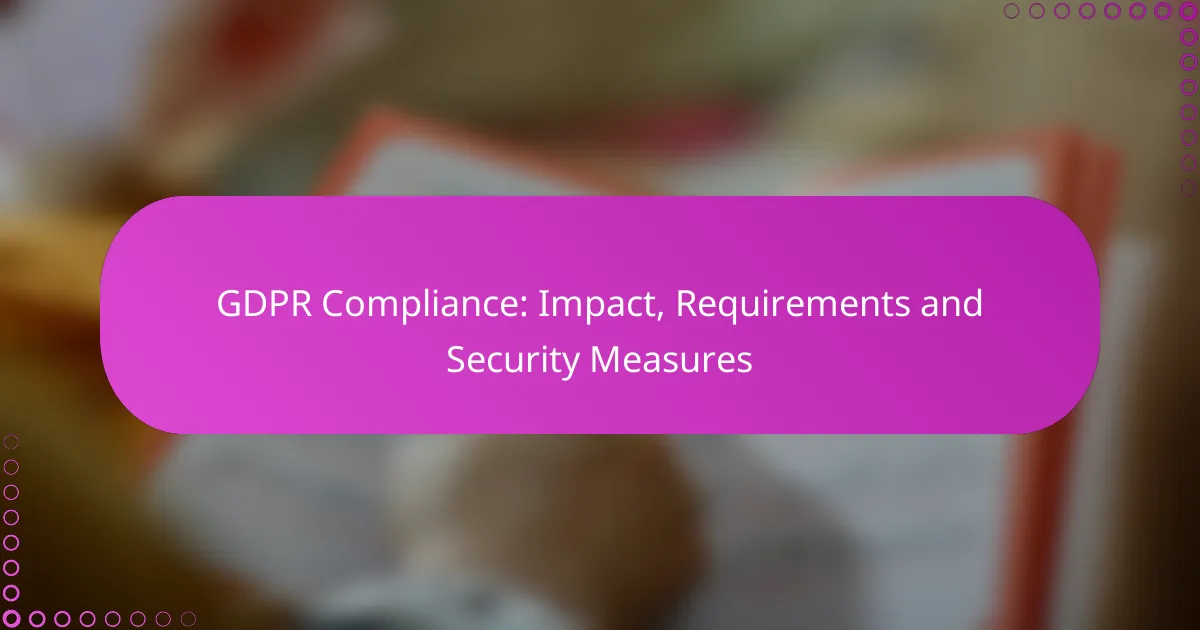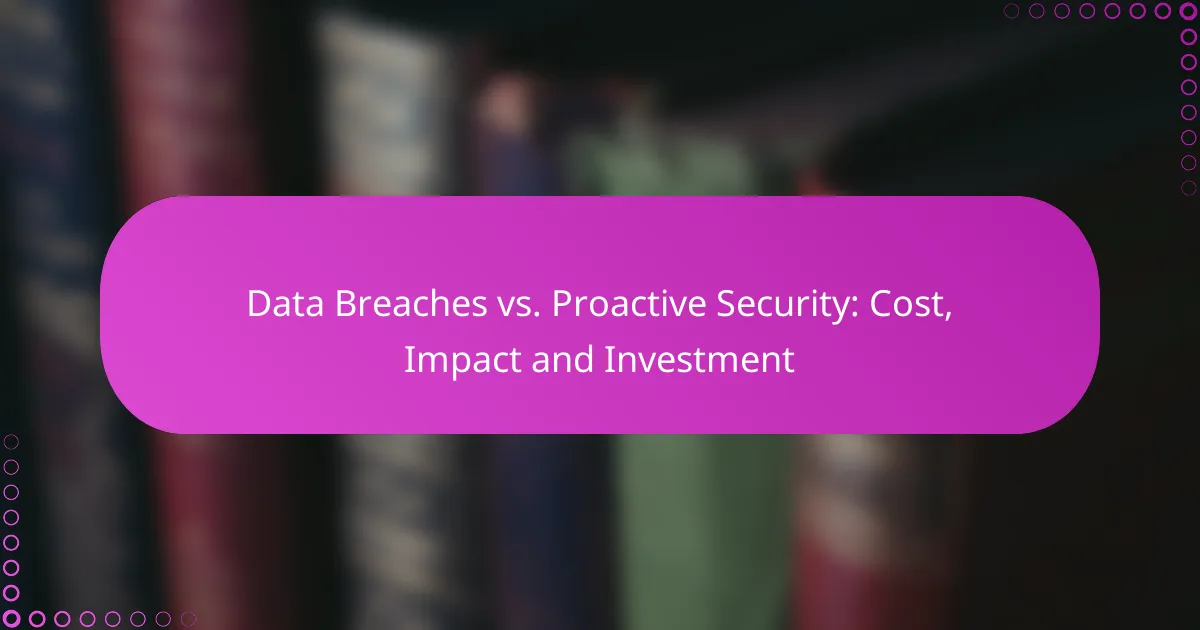The General Data Protection Regulation (GDPR) imposes stringent requirements on organizations to protect personal data and uphold privacy rights within the European Union. Compliance involves appointing a data protection officer, conducting privacy impact assessments, and implementing robust security measures such as data encryption and access controls. Businesses must navigate these regulations carefully to avoid legal repercussions and maintain customer trust.
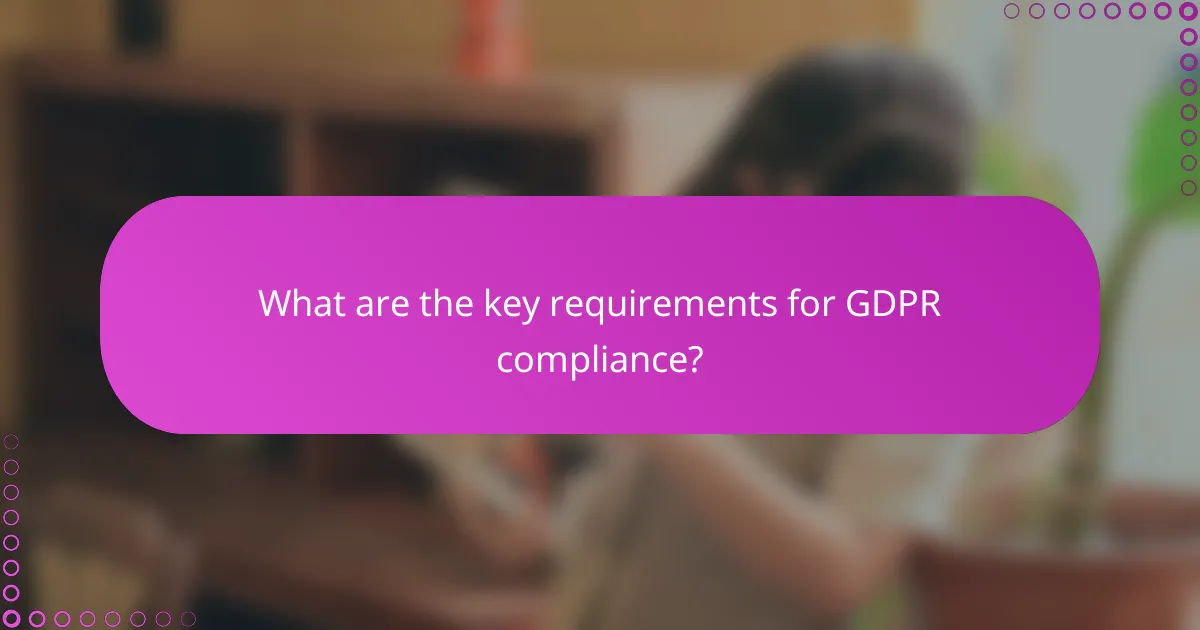
What are the key requirements for GDPR compliance?
The key requirements for GDPR compliance include appointing a data protection officer, establishing data processing agreements, conducting privacy impact assessments, ensuring data subject rights, and maintaining record-keeping obligations. Organizations must implement these measures to protect personal data and uphold individuals’ privacy rights within the European Union.
Data protection officer appointment
Appointing a data protection officer (DPO) is essential for organizations that process large volumes of personal data or handle sensitive information. The DPO is responsible for overseeing data protection strategies, ensuring compliance with GDPR, and acting as a point of contact for data subjects and regulatory authorities.
To appoint a DPO, organizations should consider candidates with expertise in data protection laws and practices. The DPO should be independent, adequately resourced, and report directly to the highest management level to ensure effective oversight.
Data processing agreements
Data processing agreements (DPAs) are contracts between data controllers and data processors that outline the terms of data processing activities. These agreements must specify the purpose of data processing, the types of personal data involved, and the security measures that will be implemented to protect the data.
When drafting a DPA, organizations should include clauses that address data breach notification, data subject rights, and the return or deletion of personal data upon contract termination. This ensures clarity and accountability in data handling practices.
Privacy impact assessments
Privacy impact assessments (PIAs) are tools used to identify and mitigate risks associated with data processing activities. Organizations are required to conduct PIAs when initiating new projects that may impact personal data privacy, particularly when using new technologies.
To perform a PIA, organizations should outline the data processing purpose, assess potential risks to individuals’ rights, and propose measures to mitigate those risks. This proactive approach helps ensure compliance and builds trust with data subjects.
Data subject rights
GDPR grants several rights to data subjects, including the right to access, rectify, erase, restrict processing, and object to data processing. Organizations must establish processes to facilitate these rights and respond to requests within one month.
To comply, organizations should implement clear procedures for handling data subject requests, maintain records of requests, and ensure staff are trained to recognize and act on these rights. This enhances transparency and accountability in data management.
Record-keeping obligations
Record-keeping obligations require organizations to maintain detailed records of their data processing activities. This includes documenting the types of personal data processed, the purposes of processing, and any data sharing arrangements with third parties.
Organizations should regularly review and update their records to reflect changes in data processing practices. Keeping accurate records not only aids compliance but also helps organizations demonstrate accountability in their data protection efforts.

How does GDPR impact businesses in the UK?
The General Data Protection Regulation (GDPR) significantly affects businesses in the UK by imposing strict rules on data protection and privacy. Companies must ensure compliance to avoid legal repercussions and maintain customer trust.
Increased accountability
GDPR mandates that businesses take greater responsibility for the personal data they process. This includes implementing clear data protection policies and appointing Data Protection Officers (DPOs) where necessary.
Organizations must also maintain detailed records of data processing activities, demonstrating compliance and accountability to regulators and customers alike.
Fines for non-compliance
Non-compliance with GDPR can result in substantial fines, which can reach up to 4% of a company’s annual global turnover or €20 million, whichever is higher. This financial risk emphasizes the importance of adhering to the regulation.
Companies should conduct regular audits and assessments to identify potential compliance gaps and mitigate risks associated with data breaches or violations.
Impact on data handling practices
GDPR requires businesses to adopt more stringent data handling practices, including obtaining explicit consent from individuals before processing their data. This shift necessitates clear communication about how data will be used.
Additionally, organizations must implement data minimization principles, ensuring they only collect and retain data that is necessary for their operations. Regular training for employees on data protection best practices is also essential to foster a culture of compliance.
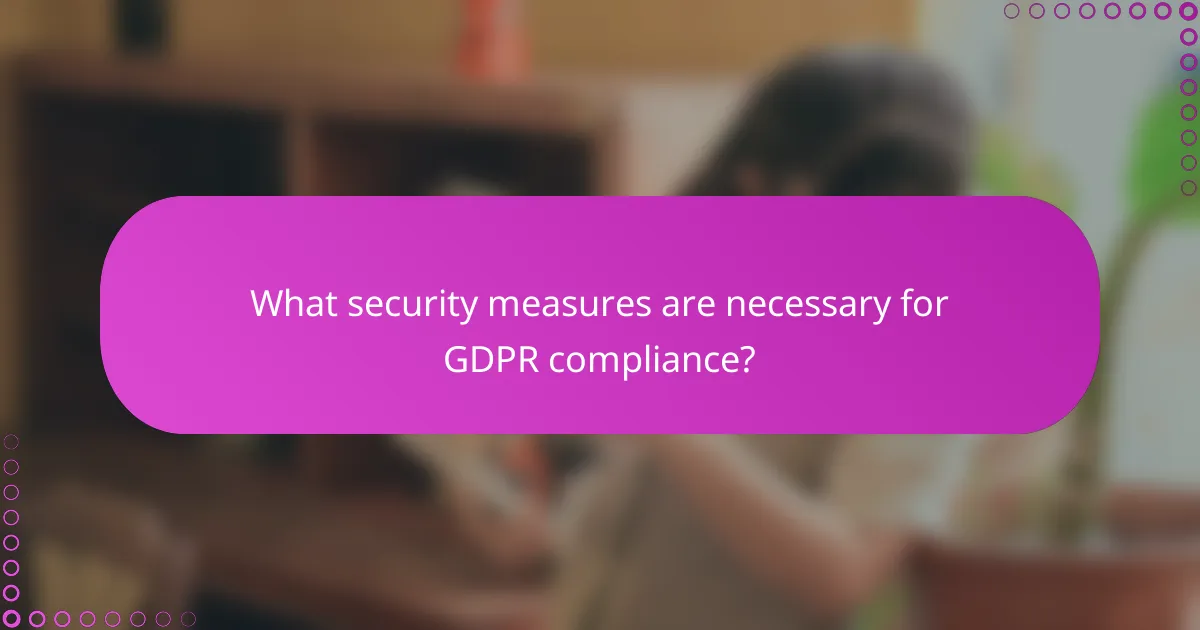
What security measures are necessary for GDPR compliance?
To achieve GDPR compliance, organizations must implement several key security measures that protect personal data from unauthorized access and breaches. These measures include data encryption, access controls, regular security audits, and incident response plans, all aimed at safeguarding sensitive information.
Data encryption
Data encryption is a critical security measure that transforms readable data into an unreadable format, ensuring that only authorized users can access it. This process is essential for protecting personal data both at rest and in transit, making it difficult for unauthorized parties to decipher the information even if they gain access.
Organizations should use strong encryption standards, such as AES-256, and ensure that encryption keys are securely managed. Regularly updating encryption protocols is also advisable to stay ahead of potential vulnerabilities.
Access controls
Implementing robust access controls is vital for limiting who can view or manipulate personal data. This includes defining user roles and permissions, ensuring that only individuals who need access to specific data for their job functions can obtain it.
Organizations should consider using multi-factor authentication (MFA) to enhance security further. Regularly reviewing access permissions and promptly revoking access for employees who change roles or leave the company is also crucial to maintaining data integrity.
Regular security audits
Conducting regular security audits helps organizations identify vulnerabilities and assess the effectiveness of their security measures. These audits should evaluate both technical controls and compliance with GDPR requirements.
Audits can be performed internally or by third-party experts, and they should include penetration testing, vulnerability assessments, and reviews of data handling practices. Establishing a routine schedule for audits, such as quarterly or biannually, can help maintain ongoing compliance.
Incident response plans
An effective incident response plan is essential for quickly addressing data breaches or security incidents. This plan should outline the steps to take when a breach occurs, including how to contain the breach, assess the damage, and notify affected individuals and authorities as required by GDPR.
Organizations should regularly test their incident response plans through simulations to ensure that all team members understand their roles and responsibilities. Having a clear communication strategy is also important to manage public relations and maintain trust with customers during a crisis.
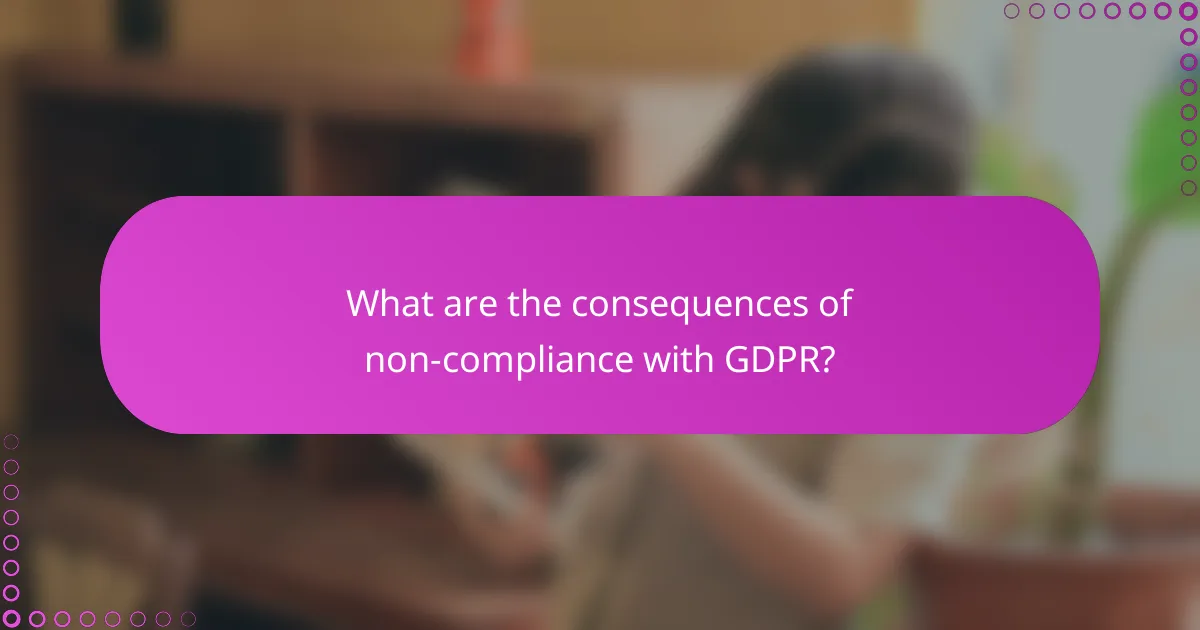
What are the consequences of non-compliance with GDPR?
Non-compliance with the General Data Protection Regulation (GDPR) can lead to severe consequences for organizations, including hefty fines, damage to reputation, and potential legal actions. Understanding these impacts is crucial for businesses operating within or dealing with the European Union.
Financial penalties
Organizations that fail to comply with GDPR can face financial penalties that range from a few thousand euros to millions, depending on the severity of the violation. The fines can reach up to 4% of a company’s annual global turnover or €20 million, whichever is higher. This significant financial risk emphasizes the importance of adhering to GDPR requirements.
To avoid these penalties, businesses should conduct regular audits of their data handling practices and ensure compliance with all GDPR principles, such as data minimization and obtaining explicit consent from users.
Reputational damage
Non-compliance with GDPR can lead to substantial reputational damage, which may affect customer trust and loyalty. Consumers are increasingly aware of their data rights and may choose to avoid businesses that mishandle personal information. A single data breach can tarnish a brand’s image and result in lost customers.
To mitigate reputational risks, organizations should prioritize transparency in their data practices and actively communicate their commitment to data protection. Implementing robust security measures can also help reassure customers about their data safety.
Legal actions
In addition to financial penalties and reputational harm, non-compliance can result in legal actions from affected individuals or regulatory bodies. Individuals may file complaints with data protection authorities, leading to investigations and potential sanctions. Furthermore, organizations may face lawsuits for damages caused by data breaches.
To minimize the risk of legal actions, companies should establish clear data protection policies, provide training for employees on GDPR compliance, and ensure that they have proper data processing agreements in place with third parties.
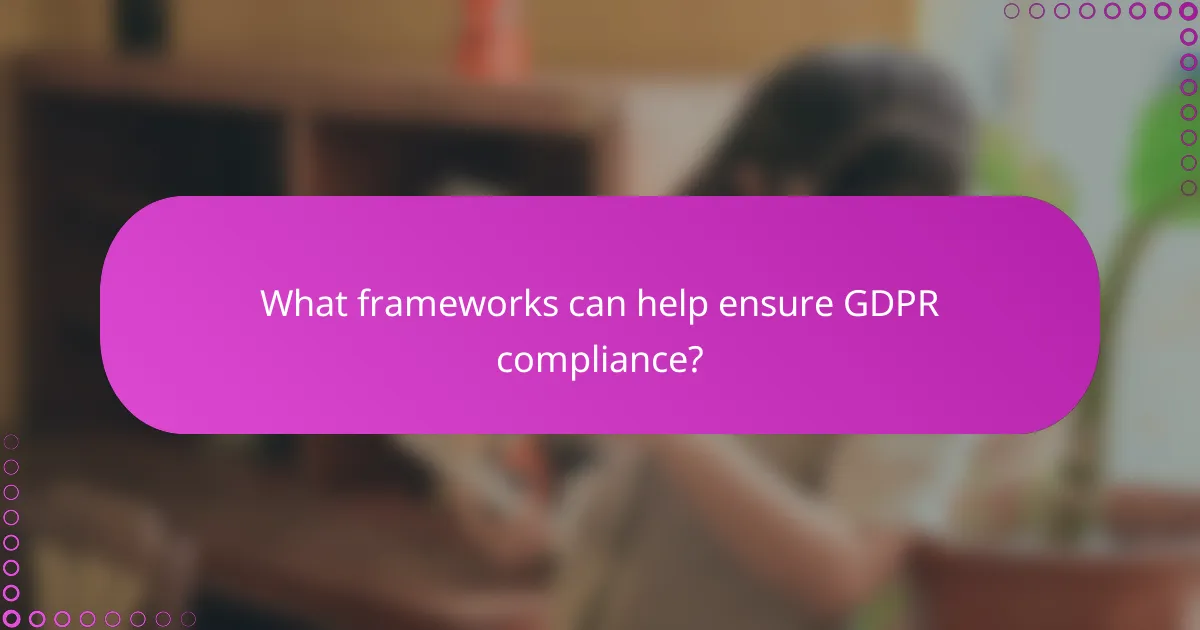
What frameworks can help ensure GDPR compliance?
Several frameworks can assist organizations in achieving GDPR compliance by providing structured approaches to data protection and privacy management. These frameworks offer guidelines and best practices that help ensure personal data is handled securely and in accordance with legal requirements.
ISO 27001 standards
ISO 27001 is an internationally recognized standard for information security management systems (ISMS). It provides a systematic approach to managing sensitive company information, ensuring data security and compliance with GDPR requirements.
Implementing ISO 27001 involves defining an ISMS policy, conducting risk assessments, and establishing controls to mitigate identified risks. Organizations should regularly review and update their ISMS to adapt to evolving threats and compliance needs.
To effectively utilize ISO 27001 for GDPR compliance, organizations should focus on key areas such as data classification, access control, and incident management. Regular audits and employee training are crucial to maintaining compliance and fostering a culture of data protection.






